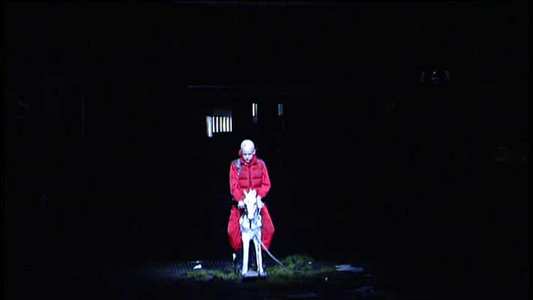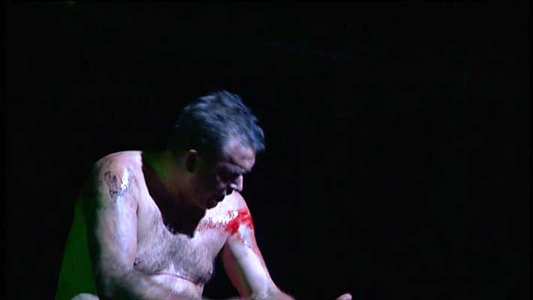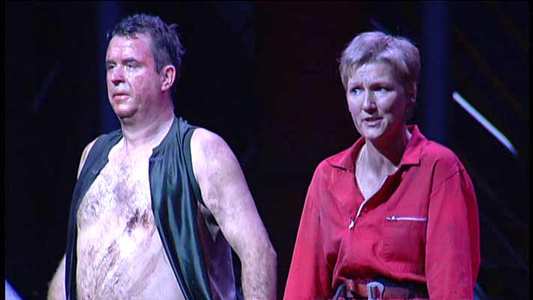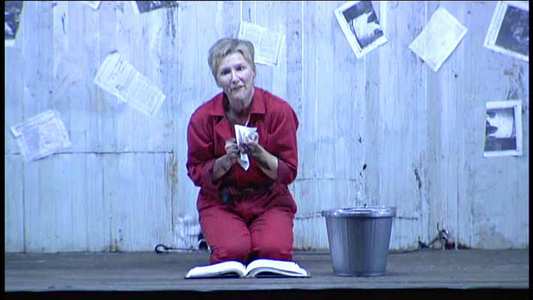Berg: Wozzeck (Weigle)
Introduction
A live performance of Alban Berg`s revolutionary expressionist opera, recorded over 2 nights in January, 2006.
Based on the incomplete play of the same name by Georg Büchner, Berg`s opera uses selected scenes to tell the uncompromisingly bleak story of the eponymous soldier, who allows himself to be subjected to the most extreme form of humiliation and barbarism just to make ends meet, and to provide for his mistress and the son they have raised together.
This story has been told several times over the last century, but Berg`s music, with its almost unbearable emotional clout, has created a work which has yet to be superceded, either on stage or on film.

Video
As with all the most recent Opus-Arte dics I have been sent, the video is almost demonstration quality.

Audio
Again, the DTS sound is superb, and the balance between pit and stage is excellent, without losing out on the incredible details of Berg`s orchestration.

Features
For such an important release, even though it`s an opera which is hugely popular already, I would have liked more `behind the scenes` footage, and certainly something perhaps on the preparation of the music, as we do not see anything of the orchestra within the performance itself. The `mini-documentary` we do have though is sufficient in explaining the basis behind Calixto Bieito`s production, and a few already well-documented facts regarding Berg`s compositional process.

Conclusion
I`m always going to be interested in a new production of Wozzeck on DVD and look forward, with a morbid fascination, to seeing how grotesque and miserable a director can make things. It is certainly a tale which can be set in almost any time and place, with the basic storyline of a poor, paranoid soldier being used and abused by society and his loved ones remaining intact. Some references within the libretto may of course have to be taken less-literally, for example the pond at the end is more of an industrial waste pipe, but hey, this is opera.
Calixto Bieito takes a no-holds-barred approach and shows us an industrial society which is tearing itself apart, symbolised by (and there are certainly plenty of symbols around here) the huge set of pipe-workings, resembling human innards, and a stream of bloodied, naked bodies being experimented upon by the sadistic doctor.
It is certainly a less `traditional` setting (as in the Claudio Abbado recording from Vienna), but no less valid. In this world, the workers are seen as highly expendable (many appear to be terminally ill, most notably Wozzeck`s son) and all exist in the lowest part of the set, with the upper echelons of society being able to view everything from walkways.
Of course, being a Bieito production, there is always going to be something which goes right over my head, and generally involving a huge amount of nakedness and/or bodily functions. He doesn`t disappoint in this respect, but there is nothing said in the accompanying booklet or documentary which explains the mass appearance of a totally nude support cast. I`m sure it has something to do with the `cleansing of humanity`.perhaps.
The video direction concentrates solely on the stage, leaving any `pit action` or artistic-flailing (if there was any) from the conductor to your imagination. This is a good thing, as it leaves us to concentrate on the complexities of the staging. It`s unfortunate that we often miss the sheer scale of the production as the cameras, quite rightly, often focus on small sections of the action, but you are still drawn into the story very effectively without being distracted by `outside` influences. It`s just a shame that the audience felt the need to burst into applause so soon after the ending (one of the most bizzarre and creepy musical passages ever written), but there was obviously a lot of pent-up emotion following such a performance.
Musically, this is the best DVD to have come from the Gran Teatre del Liceu in a long time, and can be compared very favourably to the Abbado recording I mentioned earlier. Perhaps the orchestra hasn`t got the refined quality of the Vienna State Opera, but I`m not sure this is such a bad thing. The Barcelona orchestra have no problems in carrying across every nuance of Berg`s score, and the DTS sound wipes the floor with other DVD productions I have seen. If I have one niggle, it is that Sebastian Weigle could have given more time to the earth-shattering orchestral crescendo following Marie`s murder (not as successfully carried off as I would have liked), but it is still more impressive than Abbado`s, and as with many operas there are some sections which make or break things for me. This definitely made it. Elsewhere, Weigle directs a finely-paced performance and as I have mentioned, the orchestra plays brilliantly throughout.
Singing and acting is almost uniformly excellent. Franz Hawlata (Wozzeck) is made for the role, and manages to hurtle down the path of paranoia and psychosis towards murder and `accidental` suicide in a very convincing manner.
Angela Denoke (Marie) is a less sympathetic character than is sometimes seen, but has a wonderful voice, and I was very moved in her lullaby to her son (played by a shaven-headed Gemma Velayos).
Other roles are also well cast, especially Vivian Tierney (Margret), who is always good to see, and the sickenenly sadistic doctor, played by Johann Tilli.
This has now become my top recommendation for this opera on DVD.
Your Opinions and Comments
Be the first to post a comment!